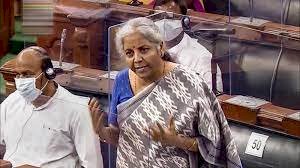Lok Sabha clears insurance divestment Bill
For Printing Download Epaper from files section from bottom of this page

New Delhi :LokSabha on Monday passed a Bill to amend the country’s general-insurance law and allow the government to offload its stake in state-run insurance corporations, clearing its first hurdle without discussion as Parliament continued to witness pandemonium.The General Insurance Business (Nationalisation) Amendment Bill, 2021 seeks to permit the government to cut its stake in prominent state-owned general insurance corporations, helping achieve its divestment targets. Divestment refers to the government’s selling of part of its ownership in state-run corporations.
The Bill aims to amend the parent Act, The General Insurance Business (Nationalisation) Act, 1972. LokSabha proceedings witnessed disruption by opposition members and had to be adjourned until Tuesday.
While presenting the budget 2021-22 in February, finance minister NirmalaSitharaman had said: “We propose to take up the privatisation of two public sector banks and one general insurance company in the year 2021-22. This would require legislative amendments and I propose to introduce the amendments in this session (Budget) itself.” The government however did not introduce the Bill in the Budget Session in February.
The finance minister, while introducing the Bill in LokSabha on June 30, sought to suggest that the government was not aiming to fully privatise government-backed insurers.
“It is not to privatise, we are certainly bringing some enabling provision so that citizens can have some participation. Our market can give the money from retail funds, through Indian citizens. It can enable faster growth for such insurance companies. The public participation is only going to help us by bringing more resources,” she had said, meaning that the government was looking to pare its stake.
According to the Bill, the proposed legislation aims to remove the requirement that the Union government should hold not less than “51% of the equity capital in a specified insurer”.
The finance minister, while introducing the Bill in LokSabha on June 30, sought to suggest that the government was not aiming to fully privatise government-backed insurers.
“It is not to privatise, we are certainly bringing some enabling provision so that citizens can have some participation. Our market can give the money from retail funds, through Indian citizens. It can enable faster growth for such insurance companies. The public participation is only going to help us by bringing more resources,” she had said, meaning that the government was looking to pare its stake.
According to the Bill, the proposed legislation aims to remove the requirement that the Union government should hold not less than “51% of the equity capital in a specified insurer”.
It also lays down the objectives of the Bill, including “greater private participation in the public sector insurance companies”.
The government hopes to achieve its planned divestment target of ₹1.75 lakh crore for 2021-22 but the target has hit hurdles posed by the pandemic
A panel headed by the finance minister had framed a policy for equity listing of the country’s largest life insurer LIC too.
However, the current Bill is aimed at divesting non-life general insurance corporations.
India has four general insurers owned by the government. These are National Insurance Company Limited, United India Insurance Company Limited, New India Assurance Company Limited and Oriental Insurance Company Limited.The government had recently cleared listing of the life insurer LIC on equity markets and initial public offerings (IPO), which refers to offering of shares of a company on the stock market to investors.The value of insurance penetration in the country stands at 3.7% of gross domestic product (GDP) against a global average of 6.31%, according to data from the finance ministry.

 Active Times
Active Times 

















